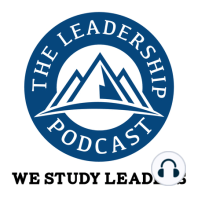33 min listen
TLP351: Coaching for Performance
ratings:
Length:
42 minutes
Released:
Mar 22, 2023
Format:
Podcast episode
Description
Sarah Wirth is President of Ecsell Institute, and co-author of the best-selling book, The Coaching Effect. Her life passion is understanding what makes people tick. Sarah has spent the last two decades researching, writing, and teaching about what the best leaders do differently. In this interview, Sarah starts the conversation with her affinity for pop culture and the lessons for leadership she finds in movies. She tells how Ecsell Institute started as training for sales leaders and expanded into helping leaders in other areas. Sarah and her team gather and analyze survey data to help leaders improve the performance of their organizations by improving their coaching. https://bit.ly/TLP-351 Key Takeaways [2:02] Sarah’s team members say she is a pop-culture guru. She likes movies, TV, books, and music, and she likes to find leadership lessons in them. She did a series on looking for leadership lessons in movies. [2:28] Past guest Dean DiSibio wrote Reel Lessons in Leadership, where he talks about leadership lessons from movies. [3:12] Sarah picks Moneyball as a movie with leadership lessons. The character Brad Pitt plays is trying to lead his team in a different direction and lead it differently than anyone has ever led a baseball team. Jan likes Blues Brothers but would pick Succession (TV show). Jim would pick Ted Lasso (TV show). [6:08] Jan and Jim once asked past guests, “How do you measure leader effectiveness?” That is the purpose of Ecsell Institute. They go to the people that are being led to measure leader effectiveness. Then they compare the results with measurable goals for that position and what the leaders are doing to reach the goals. [7:25] Ecsell Institute looks at leaders that are achieving their goals versus leaders that are not. Then they look at how those leaders are leading differently, according to their team members. That gives Ecsell Institute an understanding of the behaviors of successful leaders. [8:58] The Ecsell questions are behaviorally-based. For example, “When you have your one-to-one meetings, does your leader have you define action steps coming out of them? How often?” They are trying to find leadership behaviors to give recommendations to help others become better leaders. People can learn behaviors to emulate. [11:57] Part of the evaluation is outcome-variable questions, such as whether you see yourself working here a year from now. How happy are you in your job? How much do you trust your leader? Would you recommend your team as a great team to work with? Sarah tells how transparency in sharing the information behind the decisions made has a huge impact on trust. [13:37] The Coaching Effects Leadership Survey is consistent in terms of what it measures. How it applies to an organization is something Ecsell has a conversation about with the organization, in particular, how specific leadership traits fit into the company culture. [15:06] Communication and transparency from Ecsell are key to getting employees to trust the survey and how it works. There is even a final question that is not reported to the client, “On a scale of one to 10, how honest were you in giving your responses to these questions?” Some respondents will put a five, especially in low-trust environments. [17:39] Sarah recommends the Coaching Effects Survey for choosing which leaders to invest in. The high-rated leaders are the ones who are interested in being great at what they do. They are passionate about being good leaders. They’re the ones who want to learn more and improve. Others may have more room for improvement but high-performing leaders have more potential for improvement. [19:42] A lot of times people get promoted into leadership opportunities because they were good individual performers. Sarah talks to the newly promoted leader and to their manager to understand, does this person have leadership capability? It’s a different skill set. You might get an underperforming manager while losing a great performer.
Released:
Mar 22, 2023
Format:
Podcast episode
Titles in the series (100)
TLP006: Get to Know the Hosts of The Leadership Podcast: The inspiration behind this endeavor and what listeners should expect to gain from it. by The Leadership Podcast
